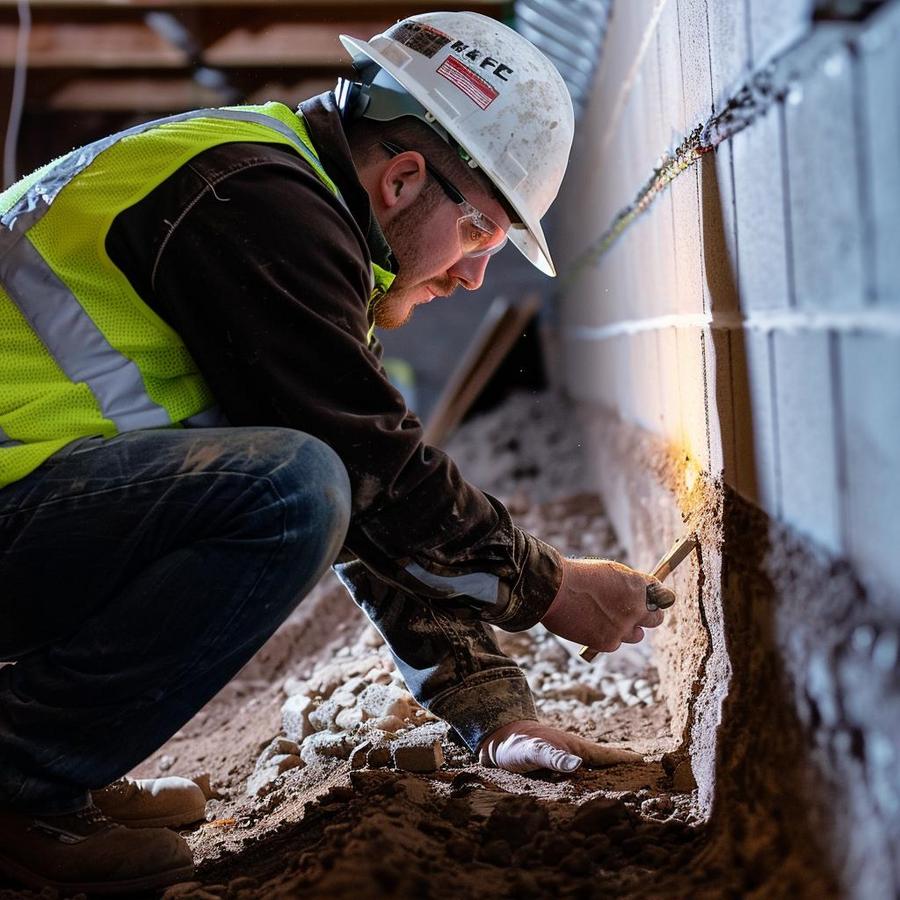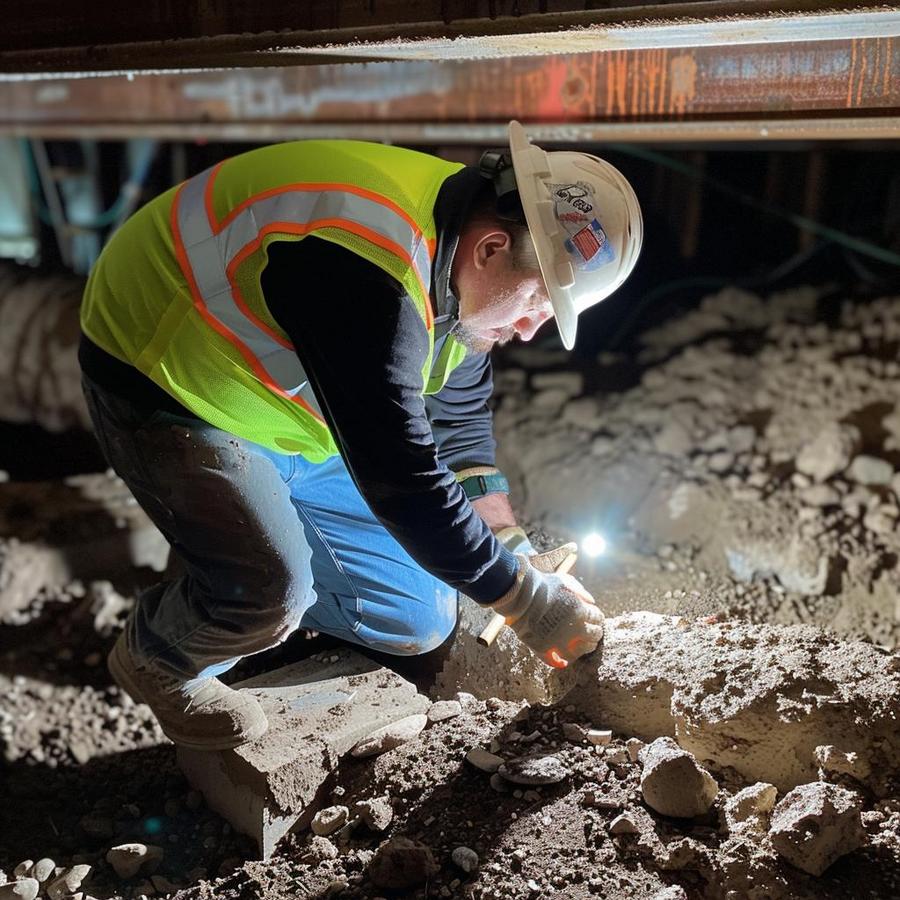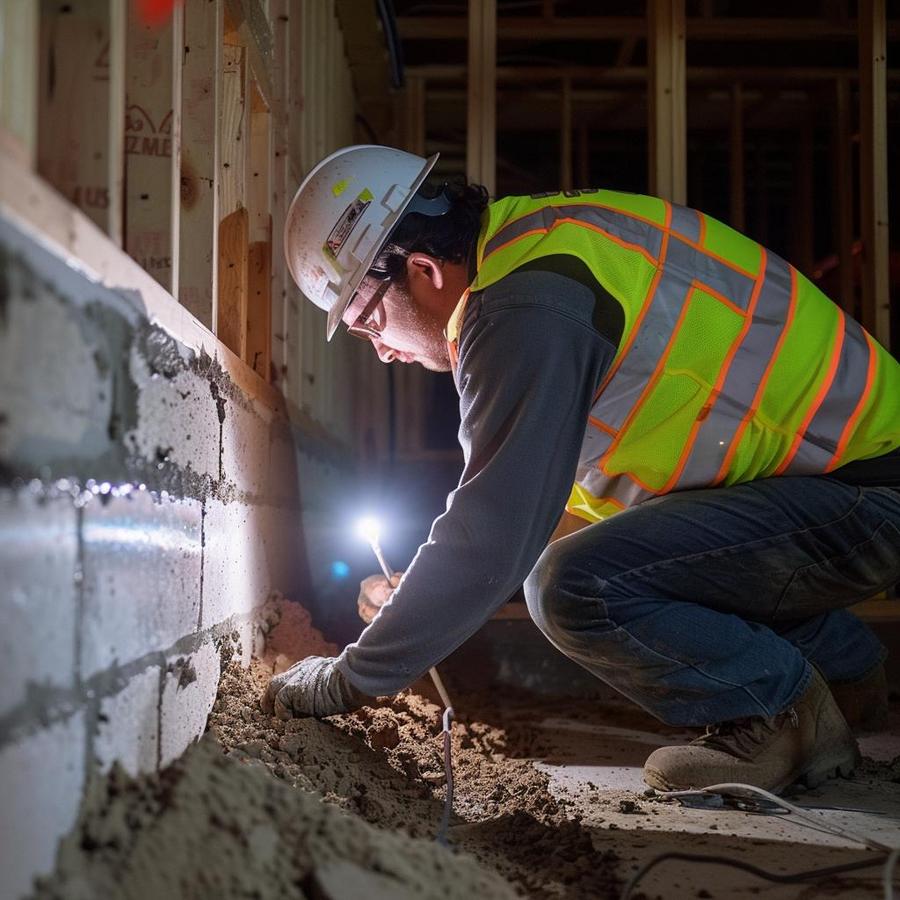Thinking of skipping a foundation inspection? You might want to reconsider. For Greensboro homeowners, your property’s stability really comes down to what’s happening beneath your feet. Even small cracks or shifts can spiral into expensive structural damage—I’ve seen hairline fractures turn into $20,000 repair jobs. A professional foundation inspection can catch these problems while they’re still manageable, which could save you from a massive headache down the road. If you plan to sell my house fast in Greensboro, knowing your foundation’s condition becomes even more critical.
TL;DR:
- Early foundation inspections prevent expensive repairs.
- Hire reputable local inspectors familiar with Greensboro soil conditions.
- Costs range from $300 to $3,000 depending on size and depth.
- Look for cracks, sticking doors, and uneven floors as warning signs.
- Inspections are crucial before buying, during construction, and when problems appear.
- Plumbing issues can impact foundation integrity.
What Should You Know About Foundation Inspection?
Why a Professional Foundation Inspection is Critical
Here’s the thing—a thorough inspection does more than just check if your house is standing straight. It examines whether your home’s base can actually handle the weight and stress it faces daily. When foundations weaken, you’ll start seeing the telltale signs: diagonal cracks running up your living room wall, that annoying leak in the basement after every rain, or floors that feel like you’re walking on a gentle slope. Good inspectors won’t just look at your foundation itself; they’ll also assess the soil conditions and how water drains around your property, since North Carolina’s clay soil can be particularly tricky.
How to Find a Reputable Foundation Inspector Near You
Finding the right inspector isn’t as simple as picking the first name in Google. You’ll want someone with proper certification—yes, that matters—and at least five years working specifically in the Greensboro area. Why local experience? Our red clay expands and contracts differently than sandy soil elsewhere. Ask potential inspectors for three recent references, and actually call them. It’s worth the extra effort. For broader context, explore our North Carolina home selling guide to understand how inspections fit into the selling process.
Expected Costs for a Foundation Inspection
Let’s talk numbers. A basic inspection for a 1,500-square-foot ranch home typically runs about $300. But if you’ve got a sprawling 4,000-square-foot Victorian with a full basement? You’re probably looking at closer to $2,500 or even $3,000. Yes, it seems steep, but consider this: catching a problem early might cost you $5,000 to fix, while ignoring it could mean a $30,000 underpinning project in two years.
Worked Example: AS-IS home value: $200,000. Estimated repairs from inspection: $15,000. Selling costs/fees: $10,000. Target investor profit: $20,000. Likely cash offer = $200,000 – $15,000 – $10,000 – $20,000 = $155,000. This trade-off offers speed and certainty but reduces equity for convenience.
What Are Common Signs of Foundation Problems?
Identifying Critical Signs of Damage
Some warning signs practically scream for attention. That door that suddenly won’t close properly? The one you have to shoulder-check just to get it shut? That’s often your first clue. Or maybe you’ve noticed your kitchen floor now has a distinct lean toward the sink—water shouldn’t naturally pool in one corner. Cracks wider than a quarter-inch, especially if they’re growing, suggest something’s seriously wrong beneath your home. If you need to sell my house fast in Raleigh, addressing these issues (or at least getting estimates) can help you set realistic expectations.
Basement Inspections and Foundation Assessment
Basements tell stories. Water stains creeping up the walls might indicate hydrostatic pressure from poor drainage. That musty smell you can’t quite eliminate? It could suggest ongoing moisture infiltration that’s slowly compromising your foundation walls. And those white, chalky deposits on your basement walls—efflorescence—appear to be harmless but often signal water movement through your foundation.
Structural Concerns vs. Minor Issues
Not every crack means disaster. Hairline cracks—think pencil-lead thin—usually just mean your house is settling into its spot, which is perfectly normal for the first few years. But when you can slide a nickel into a crack, or when walls start bowing inward? That’s when you need a structural engineer, not just a handyman with some caulk.

How Is a Foundation Inspection Conducted?
Steps in a Professional Inspection
A decent inspector starts outside, walking the perimeter like they’re casing the joint. They’re looking for tell-tale dips in the soil, cracks in the brick veneer, or that subtle bow in what should be a straight wall. Next comes the measuring—and I mean obsessive measuring. They’ll check floor levels in every room, sometimes finding slopes you never noticed.
Essential Tools Used
The tools aren’t particularly high-tech, which might surprise you. A good old-fashioned 4-foot level, a tape measure, and crack gauges that look like rulers are the workhorses. Some inspectors now use laser levels for precision, but honestly, the experienced ones can spot problems just by how a marble rolls across your floor.
The Role of Licensed Inspectors
Inside work gets interesting. They’re not just looking at obvious cracks—they’re checking where your plumbing meets the foundation, because a slow leak under your kitchen sink might be eroding the soil beneath your slab. They’ll test windows and doors, checking if that sticky bedroom door is just humidity or something more concerning.

When Is the Best Time to Get a Foundation Inspection?
Timing matters more than you’d think. Obviously, before buying a house—that’s a given. But what about during construction of an addition? Absolutely. Or when you notice your bathroom door suddenly won’t latch? Don’t wait six months hoping it’ll fix itself. I’ve also seen smart sellers get inspections done before listing. If you plan to sell my house fast in Charlotte, having that clean inspection report ready can speed up negotiations considerably.
Foundation Inspection for New Construction
New construction inspections seem unnecessary to some folks—it’s new, right? But checking that the ground was properly compacted and the footings were poured correctly can prevent settling issues that might not show up for years. It’s like insurance you hope you’ll never need.
During Real Estate Transactions
Buyers should insist on foundation inspections, period. Sellers, though, might benefit from getting one done preemptively. Nothing kills a deal faster than a buyer’s inspector finding “significant foundation concerns” two days before closing. Get ahead of it.

What to Ask Your Foundation Inspector
- What certifications and experience do you have?
- What specific issues do you see?
- Are repairs short-term or long-term solutions?
- What are the estimated costs?
- How soon should repairs be done?
Settling vs. Foundation Problems
Here’s where things get nuanced. Every house settles—it’s physics. The question is whether it’s settling evenly. A quarter-inch drop over 20 feet? That’s probably fine. But if one corner of your house has sunk two inches while the rest stayed put, you’ve got a problem. Experienced structural engineers can usually tell the difference in about 30 minutes, potentially saving you from unnecessary (and expensive) repairs. Though sometimes even they disagree, which is why second opinions exist.
Impact of Plumbing on Foundation Integrity
Connection Between Plumbing Issues and Foundation Damage
Water and foundations don’t mix well. A leaking pipe under your slab doesn’t just waste water—it causes the clay soil to expand, pushing against your foundation with surprising force. Over months or years, this pressure creates cracks and shifts that seem to come from nowhere.
Detecting Plumbing-Related Foundation Problems
The signs can be subtle at first. Maybe your water bill jumped $20 last month for no apparent reason. Or you hear water running when everything’s turned off. That patch of grass that’s always green, even during drought? Could be a leak feeding it. These clues often appear months before visible foundation damage.
Inspection Protocols for Slab and Crawl Space Foundations
Slab foundations get checked for surface changes—cracks, slopes, separations from walls. But crawl spaces? That’s where things get interesting (and usually dirtier). Inspectors look for moisture damage, wood rot in the joists, and whether your vapor barrier still exists or has deteriorated into useless scraps. Each type has its own failure patterns.
Seller Checklist for Foundation Inspections
- Schedule inspection before listing.
- Gather repair history.
- Address minor issues early.
- Get estimates for major repairs.
- Highlight recent inspection in listing.
- Choose local certified inspectors.
FAQs
How often should I get a foundation inspection?
Most experts suggest every 3-5 years, though I’d argue it depends on your situation. Noticed new cracks after that particularly dry summer? Don’t wait. Living in a 10-year-old house with no issues? Every five years is probably sufficient. Trust your gut—if something feels off, it probably is.
Can I sell my home with foundation issues?
Absolutely, though it changes the game. Cash investors often specifically look for these properties, and yes, they’ll pay less—sometimes significantly less. But the transaction can close in weeks instead of months. For example, you can sell my house fast in Durham even with foundation problems, but expect offers to reflect the $10,000-50,000 repair estimates.
Are all foundation cracks serious?
Definitely not. Those tiny hairline cracks in your garage floor? Usually just cosmetic. But horizontal cracks in basement walls, or stair-step patterns in brick? Those tend to indicate pressure or movement that needs attention. Context matters—a small crack that’s been stable for five years is less concerning than one that appeared last month.
Does insurance cover foundation repairs?
This is where it gets frustrating. Standard policies typically don’t cover “normal” foundation issues like settling or soil problems. However, if a covered peril caused the damage—say, a burst pipe led to erosion—you might have coverage. Read your policy carefully, or better yet, call your agent before assuming anything.





